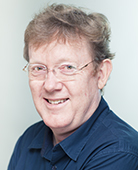
Keywords
Fields of Research (FoR)
Digital electronic devices, Digital processor architectures, Electronics, sensors and digital hardware, Concurrent/parallel systems and technologies, Dependable systems, High performance computing, Operating systems, Performance evaluationSEO tags
Biography
Dr Oliver Diessel is an Associate Professor in the School of Computer Science and Engineering.
Research interests
I develop methods for the design, test and implementation of digital systems in reconfigurable logic devices called Field-Programmable Gate Arrays.
My interest is in dynamically reconfigurable digital systems in which the circuits are modified while the system is operational.
I aim to promote the use of reconfigurable systems...view more
Dr Oliver Diessel is an Associate Professor in the School of Computer Science and Engineering.
Research interests
I develop methods for the design, test and implementation of digital systems in reconfigurable logic devices called Field-Programmable Gate Arrays.
My interest is in dynamically reconfigurable digital systems in which the circuits are modified while the system is operational.
I aim to promote the use of reconfigurable systems through the development of architectures, design methods and tools that enhance their benefits and reduce their costs.
Interest in engineering
Why did you get into engineering?
A fascination with technology and a natural tendency towards mathematics and science.
What are your research goals?
To develop smart devices that can act independently to benefit people.
What do people not understand about what you do?
They think I can help with practical issues such as fixing their PC or advising them on the best machine to buy. They would be better off asking me some theoretical questions.
Advice for prospective computer engineers & scientists
A career in computer engineering or computer science can see you changing the world. With this great power comes great responsibility. Keep an open mind to the wider implications of what you learn and do. And follow your dream.
Lectures/Courses taught
Configurable Systems
COMP4601 – Design Project B, UNSW (2009 – present)
Computer Architecture
COMP4211 – Advanced Architectures and Algorithms, UNSW (2004 – 2006)
COMP3211 – Computer Architecture, UNSW (2002 – 2006, 2012)
Digital Systems
COMP3222 – Digital Circuits and Systems, UNSW (2008, 2010 – present)
FPGA Implementation of Digital Systems using Verilog, Harbin Institute of Technology (2014 - present)
COMP2021 – Digital Systems Structures, UNSW (2000 – 2004)
FPGA Design Course, Ho Chi Minh City University of Technology (2003)
Computer Programming
COMP1921 – Data Structures and Algorithms, UNSW (2008 – 2009)
XCMP1000 – Computing 1, UNSW Asia (2007)
COMP1021 – Computing 1B, UNSW (2005)
Professional Issues & Ethics
COMP4920 – Professional Issues and Ethics, UNSW (2001)
Students
Number currently in lab: 2
Number graduated: 6
Student Projects:
Current students work on design of fault-tolerant FPGA-based systems for space and fine-grained accelerators for heterogeneous devices.
Previous students have worked on multi-core task migration, the verification of dynamically reconfigurable systems, communications infrastructure for module-based dynamically reconfigurable systems, and configuration encoding techniques for rapid reconfiguration.
Looking for students for projects related to:
Dynamic modular reconfiguration of FPGA-based TMR circuits. This project involves the development of techniques to meet reliability, performance and resource constraints for SRAM FPGA-based implementations of digital systems to recover from radiation-induced Single Event Upsets. We are investigating design approaches, CAD tools for circuit synthesis, partitioning and layout, and benchmarking with circuits typical of applications deployed in space.
Run-time validation of FPGA-based computations. Computational tasks hosted on FPGA devices are increasingly susceptible to run-time errors due to process variation, device degradation and radiation. This project seeks to develop efficient (better than TMR) techniques for checking the correctness of tasks while they are running. Another thrust is to validate dynamically acquired FPGA configurations.
Professional Organisations and Consulting positions
IEEE Member
Editorial Board, ACM Transactions on Reconfigurable Technology and Systems
Education
PhD/postgraduate
PhD, University of Newcastle, Australia, 1998
Undergraduate
B.E. (Computer, Hons), University of Newcastle, Australia, 1991
B.Math., University of Newcastle, Australia, 1991
My Research Supervision
Supervision keywords
Areas of supervision
Reconfigurable technology and systems
Electronic design automation
Computer architecture
Currently supervising
Tong Wu, MPhil in Runtime reconfiguration
Junning Fan, MPhil in Fault-tolerance of FPGA-based applications
Location
Level 5, Room 501B
Kensington Campus